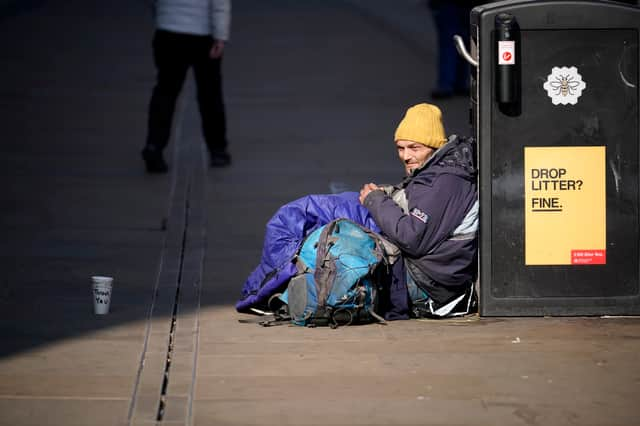1 in 7 adults in England are concerned about becoming homeless - the help and resources available


Homelessness charity Shelter has found that one in seven (14 per cent) of adults in England have become more worried about becoming homeless due to the Covid-19 pandemic.
Over a quarter of private renters (27 per cent) in England also have fears about losing their homes, according to the charity.
Advertisement
Hide AdAdvertisement
Hide AdAround 49 per cent of hospitality workers and 36 per cent of retail workers are currently renting, according to the Ministry of Housing, Communities and Local Government
Elenor Wilson, a Shelter helpline adviser, said: “People are frightened, they’re scared they might do the wrong thing, they don’t know their rights and they’re really worried they will lose their income.
“People can be quite distressed and don’t know where to turn. It can be emotional because you feel responsible for every caller.”
‘Skipping meals to pay rent’
Shelter has revealed that private renters are twice as likely to feel depressed and anxious about their housing situation, in comparison to the general population.
Advertisement
Hide AdAdvertisement
Hide AdIn the last month, 24 per cent of private renters have said they had to borrow money in order to pay their rent, 18 per cent had to cut back on food or skipped meals to pay their rent, and 12 per cent had to cut back on heating to pay their rent. This is based on a survey of more than 3,600 people in late January and early February.
Polly Neate, Chief Executive of Shelter, said: “Thanks to the generous support of the public and our partners we have been able to answer double the number of calls, but we need to keep this up if we are going to weather the coming storm.
“To make sure we can always be on the other end of the line, we’re asking the public to support our appeal.”
‘A flood of evictions’
Darren Baxter, Housing Policy and Partnerships Manager at the Joseph Rowntree Foundation (JRF) said: “We are now really concerned that the temporary eviction ban is the only dam holding back a flood of evictions, and that once it is removed in May, we will see a wave or repossessions and a surge in homelessness.
Advertisement
Hide AdAdvertisement
Hide Ad“If it is to make good on its commitment to end homelessness, the Government must introduce a targeted package of support to address high rent arrears and re-link housing benefit levels to the real cost of renting.”
‘Give renters safeguards and protection’
David Renard, housing spokesman for the Local Government Association (LGA) said: “We are keen to work with the Government on a long term plan to give renters the safeguards and protection they need to help them stay in their homes, in as many cases as possible.
“Going forward, there remains a need for a renewed focus on investing in homelessness prevention services.
“This should include ensuring councils have the resources to support households at risk of homelessness, including restoration of welfare funding to at least £250 million a year and a review of the Discretionary Housing Payment scheme.
Advertisement
Hide AdAdvertisement
Hide Ad“It is also vital councils are given the ability to invest in building much needed social housing, through the reform of Right to Buy.”
‘Support for renters’
The Government announced in early February that renters will continue to be supported during the national lockdown restrictions, with an extension so the ban on bailiff evictions.
The ban was originally introduced at the start of the pandemic, and has since been extended until 31 March, with measures kept under review in line with the latest public health advice.
Landlords are also required to issue six month notice periods to tenants before beginning possession proceedings, meaning that most renters now served notice can remain in their homes until at least August 2021, with time to find alternative support or accommodation.
Advertisement
Hide AdAdvertisement
Hide AdFor renters who require additional support, there is £180 million of government funding for Discretionary Housing Payments for councils to distribute to support renters with housing costs.
Who can claim a Discretionary Housing Payment?
You could be eligible for a Discretionary Housing Payment if you need help with housing costs and are currently claiming:
- Housing benefit or
- Universal Credit without housing costs towards rental liability
You cannot get a Discretionary Housing Payment to help with Council Tax, although some councils run similar schemes alongside their local Council Tax Support schemes.
You may be given a Discretionary Housing Payment to cover housing costs, such as:
- A rent shortfall, for example, as a result of welfare reforms
- Rent deposits or rent in advance if you need to move home
You can find out more information about how to claim Discretionary Housing Payments via your local council.
For more resources and advice, you can visit the Shelter website.